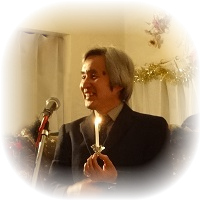↓Audio link to the sermon:(1st worship recording)
(If you can’t listen on your iPhone, please update your iOS)
This is my second sermon on the book of Jeremiah. Last month we saw how God called Jeremiah. God said to him, “Before I formed you in the womb, I knew you.” The phrase “I knew you” can be translated as “I chose you”. Jeremiah was chosen to be raised up in a close relationship with God. But God does not only know Jeremiah; He knows each one of us. And God wants to raise each of us up in a relationship with Him. God loves us and wants to nurture our faith in Him. I hope that each of us will come to have that kind of relationship with God.
Today we enter chapter 2 of the book of Jeremiah. Jeremiah speaks against the sin of his people. Israel had to be made aware of its present reality, how the people had strayed so far from God. From today’s chapter may we be reminded that we can live only by the grace of God. So let’s read Jeremiah chapter 2.
In my last sermon, I mentioned King Josiah, who carried out many religious reforms in Israel. One thing he did was to have the temple of God repaired, and during the construction they discovered the book of the Law of Moses. Israel had fallen into idol worship for so long that they had neglected to read the Scriptures. After King Josiah read the law God had given to Moses, he and his people resolved to follow it and walk in God’s ways again. This is recorded in 2 Kings 23:2-3: “He read in their hearing all the words of the Book of the Covenant, which had been found in the temple of the Lord. . . . and renewed the covenant in the presence of the Lord—to follow the Lord and keep his commands, statutes and decrees with all his heart and all his soul, thus confirming the words of the covenant written in this book. Then all the people pledged themselves to the covenant.” King Josiah challenged the people of Israel to walk in God’s ways again. These events are part of the background of Jeremiah’s story.
In Jeremiah 2:2, God says to Israel, “I remember the devotion of your youth, how as a bride you loved me and followed me through the wilderness, through a land not sown.” The people of Israel were once faithful and obedient to God. However, as God says in verse 5, “What fault did your ancestors find in me, that they strayed so far from me? They followed worthless idols and became worthless themselves.” Putting your hope in idols has no benefit, God says. Praying to idols is futile. Yet, in verse 8, Israel’s prophets “prophesied by Baal, following worthless idols.” Again, God emphasizes that worshiping idols is of no use. These idols could be found everywhere in Israel during the time of King Manasseh, Josiah’s grandfather. Idol worship included orgies and child sacrifice. This was detestable to God. Following such idols only led to tragedy in people’s lives. Even today, people still need to realize that praying to idols will not truly help them. Verse 7 says, “I brought you into a fertile land to eat its fruit and rich produce.” Jeremiah urged his people to go back to the one true God, who would provide for them abundantly.
In verse 11, God says, “Has a nation ever changed its gods? (Yet they are not gods at all.) But my people have exchanged their glorious God for worthless idols.” Israel had forsaken the true God and bowed to worthless idols. In verse 13, it says, “My people have committed two sins: They have forsaken me, the spring of living water, and have dug their own cisterns, broken cisterns that cannot hold water.” This describes how the people have lost themselves in idol worship and their hearts are empty. Do you remember the story of Jesus and the Samaritan woman? Jesus said to her, in John 4:14, “but whoever drinks the water I give them will never thirst. Indeed, the water I give them will become in them a spring of water welling up to eternal life.” For those who believe in God’s Word, the Holy Spirit will work and life will overflow like a spring of water inside them. But for those who pursue idols, their hearts and souls will be empty and ruined like broken cisterns that cannot hold water. Our faith is a living faith; the source of our life-giving water is Jesus. May we never take our eyes off Jesus.
When Israel abandoned its relationship with God, the people looked to other powers for help. Verse 18 describes Israel drinking the waters of the Nile River in Egypt and the Euphrates River in Assyria. Instead of relying on God, Israel relied on foreign countries and gained a temporary peace. They had a habit of relying on man rather than on God. Furthermore, Jeremiah describes Israel’s idol worship as committing adultery. Verse 20 says, “Indeed, on every high hill and under every spreading tree you lay down as a prostitute.”
Verse 29 goes on to say, “Why do you bring charges against me? You have all rebelled against me.” To bring Israel back to Himself in repentance, God allowed the people to go through many trials and difficulties. Israel still didn’t return. That’s what Israel was like. Still, it was necessary for Jeremiah to point out his people’s sin.
I believe that, when we go through hardships, it is appropriate to ask, “Where is the Lord?” It’s good for us to pause and remember how God has been good to us in the past. God was good to Israel by rescuing them from slavery in Egypt. By His grace, Israel entered a good and fertile land. We should not forget the God’s love, but remind ourselves of his grace and trust Him. In Revelation 2:4, God said to the church of Ephesus, “Yet I hold this against you: You have forsaken the love you had at first.” Every day, we should look for God and make ourselves aware of his love again.
(If you can’t hear from the bar above, click the blue button)
iPhone





 日本語
日本語